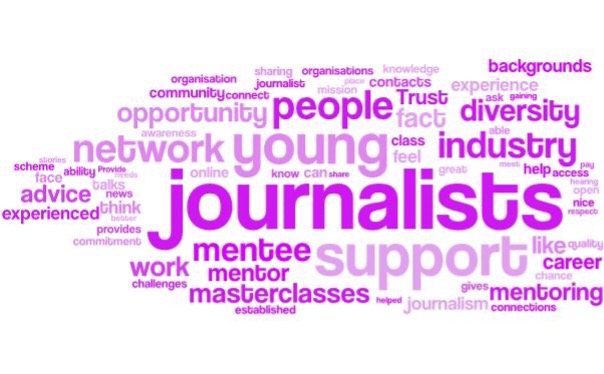
Responses to the question: ‘What word do you think of when you think of the John Schofield Trust?’
Thank you for taking the time to fill in our survey which has provided us with valuable feedback on what we do and how we do it.
Here are some of the headlines, and some of your powerful quotes on the Trust, the broadcast media, and the challenges of working in the industry today.
Which social media platforms do you follow JST on?
Twitter: 92%
LinkedIn: 59%
Instagram: 21%
Facebook: 17%
I don’t follow the Trust on social media: 5%
What do you look for in JST social media posts?
News about other mentees and mentors: 75%
Awareness of the Trust activities and objectives: 57%
A community of like-minded professionals: 54%
Jobs and career opportunities: 49%
I don’t follow the Trust on social media: 8%
What do you most value about the John Schofield Trust?
‘JST has become the industry leader for encouraging and supporting young journalists. In particular its support of … diversity in the news industry is exemplary.’ – former mentor
‘I think the pandemic has made the Trust seem even more flexible in its support. As a former mentee I probably wouldn’t have kept engaging with it as much if I didn’t have access to the talks online.’ – former mentee
‘The sense of community. It’s not just the support you get from your allocated mentor; attending events, I’ve met so many experienced people and newcomers that builds a network you can’t get from your own newsroom. I’ve been fortunate enough to shadow a team thanks to a conversation I had at a JST event. … I now have contacts in other organisations that I feel I could drop a message and ask for advice before applying for a job, for example.’ – former mentee & former online mentor
‘I was a founder and I’m pleased that it has grown into a worthy tribute and memorial to my late colleague John Schofield by making a difference for young journalists from a wide variety of backgrounds’ – former mentor
‘I think it is quite a kind organisation, and one where we can be open about any career development needs, and it is also really nice to meet other young journalists who are not from the same organisation as the one I work for. It’s a neutral ground!’ – current mentee
What are the biggest challenges facing young journalists in the UK today?
‘Precarious work is a structural barrier creating a disparate class gap. Those who can’t afford this precarity, end up having to work in parallel fields, multiple jobs, or temporarily leaving the industry, and, I then find, are misunderstood by editors as not being as ‘focused’ or ‘keen’ because they don’t have as much directly relevant or recent experience. The stress can also impact performance.’ – current mentee
‘Finding proper ‘jobs’ and spending years on freelance contracts. And some catapulted into high profile reporting to meet the perceived need to reach younger audiences with little training or experience. Not having mentors or guides at work to give advice and them to learn from.’ – current mentor
‘Financial accessibility – travelling to a major city, mostly London and working unpaid or for a very low wage is not realistic, added to that the pressures of buying suitable workwear and an expectation of (expensive) education to degree or masters level.’ – current mentor
‘Getting access to newsrooms outside of London. Newspapers and broadcasters have closed lots of regional offices so it’s really tough if you live outside of London.’ – former mentee
‘Job security and career progression. Often you have to sacrifice one for the other.’ – former mentee
These statistics and quotes will inform our future plans, so thank you once again to everyone who completed our survey!
